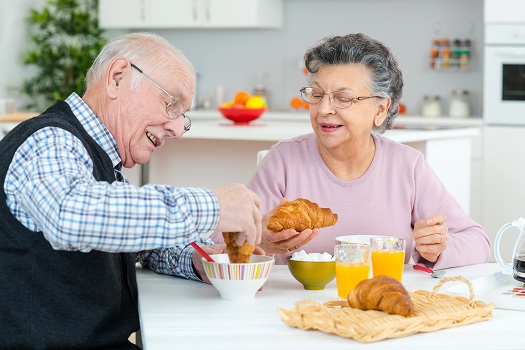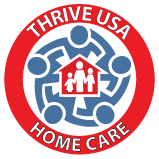6 Tips for Helping Older Adults Overcome Challenges to Eating Healthy
As people grow older, their tastes change, which typically leads to a decrease in appetite. Other variables linked with the aging process may also make it difficult for seniors to satisfy their nutritional needs, thus increasing their risk of developing nutritional deficiencies and weakness. Fortunately, the following suggestions may help your senior loved one in overcoming the challenges of eating well.
Eat Smaller Meals

Instead of serving three large meals a day, provide smaller, more frequent meals to ensure your loved one does not become too full and disinterested in eating the subsequent meal. Make sure the smaller meals are high in minerals, fiber, and protein so that your loved one receives a wide variety of foods and stays strong. A home caregiver can assist your loved one with meal planning and preparation.
Encourage Exercise

Sedentary lifestyles are common among seniors, which might hinder the development of a healthy appetite. Take a walk around the neighborhood before mealtimes to spark your loved one’s appetite. The combination of cardiovascular activity and natural outside light can stimulate appetite, making your loved one eager to eat. If you find it difficult to prepare nutritional meals on a regular basis and assist your loved one in exercising properly, a professional caregiver may be an invaluable resource.
Consider Side- Effects of Meds
Certain drugs can produce nausea and vomiting as well as lack of appetite. If your loved one becomes ill after taking medication, contact a doctor. The drugs will be reviewed by the doctor to see whether they are creating digestive or gastrointestinal problems. If this is the case, the dose may be reduced or the medicine discontinued entirely.
Discuss Appetite Boosters

If your loved one refuses to eat, discuss with his or her doctor the possibility of giving appetite stimulants. While these drugs are most typically recommended to seniors with end-stage disease or who are receiving chemotherapy, they can also be prescribed to seniors who have low appetites and are at risk of nutritional deficiencies. These drugs are quite powerful at increasing appetite, and they usually work very quickly.
Keep an Eye out for Depression
Depression is common in the elderly. Your loved one may have a decreased appetite if he or she is sad. Keep an eye out for indicators of depression, such as frequent crying, sleeping too much or too little, social isolation, and aggressive behavior. If you suspect a loved one is depressed, talk to him or her about it. Seniors who communicate their emotions to family members may be less prone to suffer from depression and associated hunger difficulties. If talking doesn’t help, schedule an appointment with your doctor, who may refer you to a mental health professional.
Schedule a Physical
If your loved one isn’t eating properly, make an appointment for a physical. Diabetes, chronic obstructive lung disease, severe pain, liver illness, renal issues, or a urinary tract infection can all cause a loss of appetite. Recognizing and addressing these health issues may result in a more robust appetite.
Your aging loved one in Maryland or DC can live a happier and healthier life with the assistance of the caregivers at Thrive USA Homecare. We encourage seniors to eat nutritious meals, exercise, and interact on a regular basis, as well as focus on other lifestyle variables that improve life expectancy. Call us now at (301) 882-4717 to learn how we can provide you with the peace of mind that comes from knowing your loved one is being cared for professionally and compassionately.


